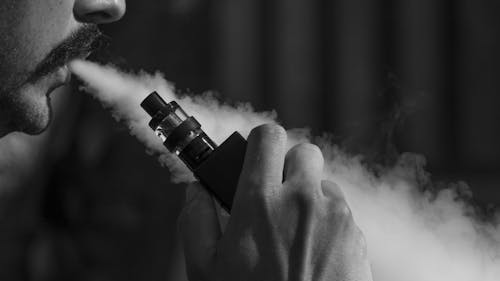EDITORIAL: For your sake, say no to vape
Vaping has become an epidemic with no cure in sight

Vaping has become this generation’s goliath.
While only nine percent of adults vape in the U.S., 27.5 percent of teens use some type of e-cigarette device. "Nearly 1 million youth e-cigarette users use the product daily, and 1.6 million use it more than 20 times per month,” according to the Food and Drug Administration (FDA).
The negative health effects of vaping may not be as thoroughly examined as those caused by cigarettes, but they certainly exist. It does not take an empirical study to prove that inhaling something into your lungs, other than clean air, is not great. The World Health Organization has stated that both e-cigarettes and cigarettes are dangerous.
Our generation saw the decline of cigarette usage “from 42 (percent) in 1965 to 14 (percent) in 2019,” and yet vapes remain ubiquitous. Why? Because they are perfect for young smokers. Easy to hide, easy to buy and flavored — they appeal to the smoker who has to hide their habit.
People get hooked on pineapple-flavored nicotine without even realizing it. One hit turns into daily smoking, and what was once only something done with friends becomes a physical and psychological dependence.
What is perhaps worse is that most people stuck in nicotine addiction do not want to vape. Healthline reports “over 60 percent of adults who currently vape want to quit the habit, according to new research from Medical University of South Carolina.” There is no clear quitting strategy or tool to use to quit vaping. The irony of a device “intended” to help people quit cigarettes becoming the next nicotine fad should not be lost on you.
Obviously, the best way to avoid these problems is to not vape in the first place, but that is simply not the reality for thousands of people who have, one way or another, picked up the habit. So the question now is, what can be done to help people quit and prevent new users?
There are several tactics employed both by the government and independent organizations, none of which seem to be working. Criminalization, regulation and anti-vaping campaigns have more or less flunked. Marketing regulation has some potential.
Criminalizing the use of any addictive product does not stop people from using it, but puts them in a position to break the law while smoking. New Jersey has several anti-vape laws, the simplest of which prevents the sale of e-cigarette products to those under 21. As any New Brunswick resident will tell you, this law means nothing in corner stores that rarely check IDs or even ask for your age.
Walks to corner stores with your friends to buy a vape, or hitting your friend's vape at a party is par for the course for most college students. The social life that vaping has taken on makes it all the more dangerous, a dangerous habit seems almost benign when all your friends do it in an easygoing setting.
Regulation of the industry has also proven toothless, not because those regulations are not enforced but because they are not designed to truly handicap the vape industry. The FDA requires vape manufacturers to jump through a series of hoops, including a modified risk tobacco product application, but at the end of the day, vape products are still approved. That said, most recently the FDA ordered more than 5 million e-cigarette products off the market.
One area that may see some improvement is decreased marketing of vaping products. Truth Initiative reported in 2018 that vaping companies were sponsoring concerts, offering scholarships and more to put their name out there. The colorful packaging and flavoring makes vaping more appealing than other tobacco products.
Countermarketing provides information on the side effects of vaping, which can be as extreme as popcorn lung or as mild as shortness of breath. While the long term side effects of e-cigarettes are unknown, we can assume they will be similar to those of cigarettes.
This past October, the FDA banned the marketing of e-cigarettes and required companies to prove that vapes are marginally safer than cigarettes. The effectiveness of this kind of legal action remains to be seen.
Vape marketing has convinced the general public that vaping is safer than cigarettes, something that is proving deadly among young people. Anti-vaping campaigns must continue to counter that idea in an effort to convince people to quit.
It should go without saying that quitting is hard. It will be an uphill battle for many of our peers and friends. That said, Rutgers offers help with substance abuse. Counseling, Alcohol and Other Drug Assistance Program & Psychiatric Services has programs specifically dedicated to substance abuse, which includes nicotine.
There is no snake oil cure for a nicotine addiction or the vape crisis. It will take patience and a lot of effort and enforced restrictions against vape companies to lower rates of addiction. But for now, some of us will enjoy our fruity flavors.
The Daily Targum's editorials represent the views of the majority of the 153rd editorial board. Columns, cartoons and letters do not necessarily reflect the views of the Targum Publishing Company or its staff.



